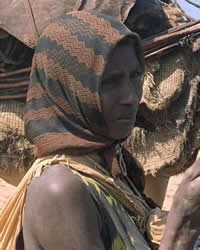Rahanweyn in Somalia

Photo Source:
Jerome Delay
Creative Commons
|
Send Joshua Project a map of this people group.
|
| People Name: | Rahanweyn |
| Country: | Somalia |
| 10/40 Window: | Yes |
| Population: | 2,493,000 |
| World Population: | 2,493,000 |
| Primary Language: | Maay |
| Primary Religion: | Islam |
| Christian Adherents: | 1.09 % |
| Evangelicals: | 0.91 % |
| Scripture: | Portions |
| Ministry Resources: | No |
| Jesus Film: | Yes |
| Audio Recordings: | Yes |
| People Cluster: | Somali |
| Affinity Bloc: | Horn of Africa Peoples |
| Progress Level: |
|
Introduction / History
Somalis are one ethnic group, but they are divided by clans. Somalis have maintained their clan affiliations, one of which is the Rahanweyn. Most of the Rahanweyn Somali live along the western border of Somalia, where they inhabit the fertile regions around the Wabi Shebele tributary.
What Are Their Lives Like?
The part of Africa in which the Rahanweyn live is known for its agriculture. Their farmers grow wheat, vegetables and coffee. In addition, they cultivate melons, dates, mangoes and pomegranates. They keep domestic animals in small yards to supply themselves with a consistent supply of milk, eggs and meat.
One style of village home is made of mud brick, with a flat roof and one interior room. Occasionally, homes will have thatched roofs that extend out to make porches. Most families have one or more of these houses, all of which are enclosed by walls of mud or thorns. The other style house that the Rahanweyn may live in is called a Sudanese-style house. This is a round one-room hut with a cone-shaped thatch roof. In some areas the bases are made of mud, and in others, they are made of thatch. The Sudanese-style house is particularly popular in the Nile River region.
Rahanweyn marriages are typically endogamous, which means that they only marry within their own clans. They are also monogamous (one husband, one wife). In the past, marriages were arranged, but it is now becoming more acceptable for an individual to choose his own mate. In their society, children are seen as the family's greatest asset. Inheritances are passed from fathers to sons and boys inherit more than girls. The value of young women is determined by their ability to have children and bond families through marriage.
Social life is extremely important to the Rahanweyn. They share a tradition of a daily coffee time. Because wood is expensive and somewhat scarce, the Rahanweyn use animal dung for fuel.
Despite the teachings of Islam, the Rahanweyn maintain different social classes. Manner of dress is one of the distinguishing factors of class. Women wear veils both at home and while they are in town. When boys enter into manhood, they are allowed to wear a different type of headgear.
What Are Their Beliefs?
Being Muslims, the Rahanweyn follow the teachings of the prophet Mohammed. They believe that the only way to heaven is through following the teachings of their holy book, the Koran. Their religion is one of works based on five basic teachings or "pillars." These include affirming that Allah is the only god and Mohammed is his prophet. They are also required to pray five times a day while facing Mecca, give alms to the poor, fast during the month of Ramadan, and try to make at least one pilgrimage to Mecca.
What Are Their Needs?
The Rahanweyn in Somalia are virtually all Muslim, and at present there are very few believers in their communities. Evangelization will be challenging due to the fact that outsiders who enter Somalia are always in danger.
Prayer Points
Ask the Lord of the harvest to make a way for the Rahanweyn of Somalia to hear and respond to Jesus Christ.
Ask the Lord to soften the hearts of the Rahanweyn so that they will be receptive to the gospel.
Pray that God will use the few Rahanweyn believers to share the gospel with their own people.
Ask God to raise up prayer warriors who will faithfully intercede for the Rahanweyn.
Pray for Rahanweyn people who will disciple others in the ways of Jesus Christ.